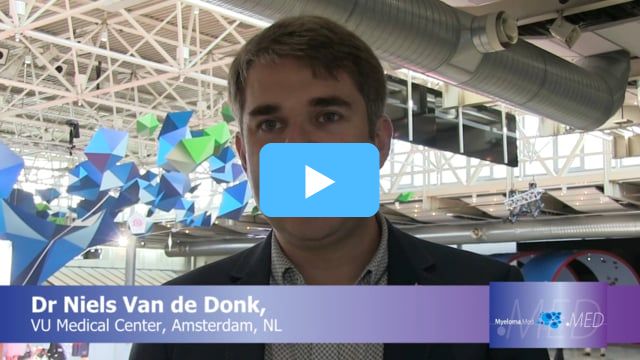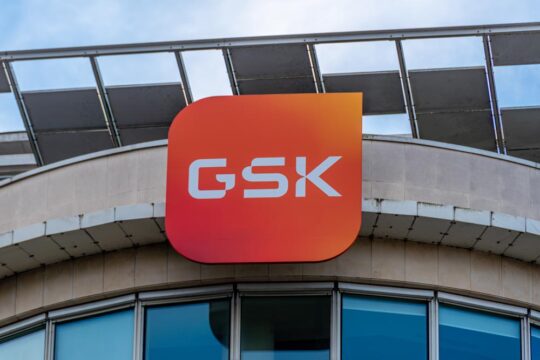Advertisment
EHA 2018: Immunotherapy in MM: why, when and how?

The pathophysiology of MM is characterised by a state of profound immunosuppression through multiple mechanisms which provides a strong rationale for immunotherapeutic approaches including antibodies, immunomodulators, vaccines and adoptive cellular therapies. In an educational session at EHA 2018 Dr Niels van de Donk from Amsterdam outlined the importance of immunotherapy in the treatment of MM now and in the future, focussing especially the role of antibody combinations in the upfront setting and the promise of CAR-T cell therapy.
Author: Maria Dalby. Interviewer: Esther Drain.
Dr Niels Van de Donk (Amsterdam) provides an update on monoclonal antibodies for the treatment of MM…
… and reviews immunotherapy combinations in myeloma.
In recent years monoclonal antibodies as single-agent therapy or in combination with IMiD or PI backbone therapy have dramatically improved response rates and survival in patients with relapsed and refractory MM. Elotuzumab is a humanised monoclonal antibody against SLAMF7 which is highly expressed on myeloma cells and natural killer cells, but not in normal tissue.1 Elotuzumab lacks single-agent activity in extensively pre-treated MM, but the randomised phase 3 ELOQUENT-2 trial showed a significant improvement in PFS with combination therapy with elotuzumab, lenalidomide and dexamethasone (ERd) compared with Rd alone, including in patients with high risk cytogenetics.2 In contrast, monoclonal antibodies against CD38 including daratumumab and isatuximab have been shown to be effective as monotherapy in heavily pre-treated MM patients,3 but there is nevertheless a strong rationale for using them in combination with IMiDs and PIs to target multiple mechanisms and as far as possible prevent the outgrowth of a resistant MM clone.4-6 Daratumumab has been shown to dramatically prolong PFS and postpone development of resistance in combination with Rd in the POLLUX study,7 with bortezomib and dexamethasone (Vd) in the CASTOR study,8 and with bortezomib, melphalan and prednisone (VMP) in the ALCYONE study.9 The CASTOR study also confirmed that daratumumab in combination with Vd is capable of almost completely abrogating high-risk cytogenetics.10 A systematic review and network meta-analysis published in 2017 identified DRd as the best available treatment for RRMM in terms of PFS.11 Triplet therapy with daratumumab or elotuzumab is one of the recommended treatment options at first relapse in current evidence-based treatment guidelines issued by ESMO; daratumumab monotherapy is recommended as an option at second relapse.12
The treatment benefit in terms of response and survival, together with manageable toxicity in heavily pre-treated MM patients has provided a rationale for evaluating monoclonal antibodies in the newly diagnosed setting. Two major phase 3 trials are underway and fully enrolled: the CASSIOPEIA study which will evaluate daratumumab in combination with bortezomib, thalidomide and dexamethasone (VTD) as induction and consolidation therapy versus VTD alone, followed by daratumumab maintenance or observation only in transplant-eligible patients with newly-diagnosed MM. In Germany, the HD6 trial will evaluate induction and consolidation with VRd with or without elotuzumab followed by lenalidomide maintenance with or without elotuzumab. A further study, EMN017/HOVON158/MMY3014, is due to begin soon and will evaluate induction and consolidation with VRd with or without daratumumab followed by lenalidomide maintenance with or without daratumumab, and will include MRD status after consolidation as a secondary endpoint. In transplant ineligible patients, results from the ALCYONE study show that daratumumab in combination with VMP significantly improves outcomes compared with VMP alone regardless of patient age.13
A very promising development within immunotherapy for MM are the T-cell mediated immunotherapies, including bispecific antibodies which target both immune cells and tumour cells, and adoptive cellular therapies which allow for the delivery of active immune cells. Trials with allogeneic stem cell transplantation and donor lymphocyte infusions have shown T-cells to be very powerful effector cells in MM; however, poor tolerability and high rates of treatment-related mortality have so far limited their clinical application. Most promising at the moment is chimeric antigen receptor (CAR)-T cells which are engineered to possess high-affinity receptors that are specific for particular antigens expressed on tumour cells.14 One such antigen is B-cell maturation antigen (BCMA), a member of the TNF superfamily which is broadly expressed on MM cells and therefore a suitable target for CAR-T cell therapy.15 A number of clinical trials with CAR-T cells against BCMA are currently in progress, of different designs and in different patient populations. The first-in-human study with BCMA CAR-T cells reported an overall response rate of 81% and a median event-free survival of 31 weeks among 16 patients with a median of 9.5 prior lines of therapy.16 In the bb2121 study, 18 patients with a median of seven prior lines of therapies achieved an overall response rate of 94% and a median PFS of 11.8 months.17 Dr van de Donk did point out that CAR-T cell therapy and other T-cell redirection therapies are associated with a set of unique and potentially severe acute toxicities including cytokine release syndrome (CRS) and CAR-T-cell-related encephalopathy syndrome (CRES), and intensive monitoring and prompt management with steroids, anti-IL6 therapy and supportive care will be required to minimise treatment-related morbidity and mortality.18
Another promising immunotherapeutic option consists of antibody-drug conjugates which are capable of selectively targeting and killing MM cells through delivery of a conjugated cytotoxic or radioactive drug particle.19 GSK2857916 is a humanised afucosylated IgG1 anti-BCMA antibody which has demonstrated clinical efficacy in heavily pre-treated MM patients, with an overall response rate of 58% among patients refractory to both IMiD and PI therapy and a median PFS of 7.9 months.20 Thrombocytopenia and low-grade corneal events were the most frequently reported adverse events and most common reason for dose modification, and the investigators concluded that GSK2857916 had a manageable safety profile and warrants further evaluation.
References
- Hsi ED, Steinle R, Balasa B, et al. CS1, a potential new therapeutic antibody target for the treatment of multiple myeloma. Clin Cancer Res 2008;14:2775-84.
- Dimopoulos MA, Lonial S, White D, et al. PHASE 3 ELOQUENT-2 STUDY: EXTENDED 4-YEAR FOLLOW-UP OF ELOTUZUMAB PLUS LENALIDOMIDE/DEXAMETHASONE VS LENALIDOMIDE/DEXAMETHASONE IN RELAPSED/REFRACTORY MULTIPLE MYELOMA. Haematologica 2017;102:167.
- Lokhorst HM, Plesner T, Laubach JP, et al. Targeting CD38 with Daratumumab Monotherapy in Multiple Myeloma. N Engl J Med 2015;373:1207-19.
- Keats JJ, Chesi M, Egan JB, et al. Clonal competition with alternating dominance in multiple myeloma. Blood 2012;120:1067-76.
- Morgan GJ, Walker BA, Davies FE. The genetic architecture of multiple myeloma. Nat Rev Cancer 2012;12:335-48.
- Walker BA, Wardell CP, Melchor L, et al. Intraclonal heterogeneity is a critical early event in the development of myeloma and precedes the development of clinical symptoms. Leukemia 2014;28:384-90.
- Dimopoulos MA, Oriol A, Nahi H, et al. Daratumumab, Lenalidomide, and Dexamethasone for Multiple Myeloma. N Engl J Med 2016;375:1319-1331.
- Palumbo A, Chanan-Khan A, Weisel K, et al. Daratumumab, Bortezomib, and Dexamethasone for Multiple Myeloma. N Engl J Med 2016;375:754-66.
- Mateos MV, Dimopoulos MA, Cavo M, et al. Daratumumab plus Bortezomib, Melphalan, and Prednisone for Untreated Myeloma. N Engl J Med 2018;378:518-528.
- Mateos M-V, Estell J, Barreto W, et al. Efficacy of Daratumumab, Bortezomib, and Dexamethasone Versus Bortezomib and Dexamethasone in Relapsed or Refractory Myeloma Based on Prior Lines of Therapy: Updated Analysis of Castor. Blood 2016;128:1150-1150.
- Beurden-Tan CHYv, Franken MG, Blommestein HM, et al. Systematic Literature Review and Network Meta-Analysis of Treatment Outcomes in Relapsed and/or Refractory Multiple Myeloma. Journal of Clinical Oncology 2017;35:1312-1319.
- Moreau P, San Miguel J, Sonneveld P, et al. Multiple myeloma: ESMO Clinical Practice Guidelines for diagnosis, treatment and follow-up. Ann Oncol 2017;28:iv52-iv61.
- San-Miguel J, Iida S, Blade J, et al. DARATUMUMAB PLUS BORTEZOMIB-MELPHALAN-PREDNISONE (VMP) IN ELDERLY (≥75 YEARS OF AGE) PATIENTS WITH NEWLY DIAGNOSED MULTIPLE MYELOMA INELIGIBLE FOR TRANSPLANTATION (ALCYONE). 23rd Congress of the European Hematology Association. Stockholm, Sweden, 2018.
- Kershaw MH, Westwood JA, Darcy PK. Gene-engineered T cells for cancer therapy. Nat Rev Cancer 2013;13:525-41.
- Hengeveld PJ, Kersten MJ. B-cell activating factor in the pathophysiology of multiple myeloma: a target for therapy? Blood Cancer J 2015;5:e282.
- Brudno JN, Maric I, Hartman SD, et al. T Cells Genetically Modified to Express an Anti-B-Cell Maturation Antigen Chimeric Antigen Receptor Cause Remissions of Poor-Prognosis Relapsed Multiple Myeloma. J Clin Oncol 2018:JCO2018778084.
- Raje NS, Berdeja JG, Lin Y, et al. bb2121 anti-BCMA CAR T-cell therapy in patients with relapsed/refractory multiple myeloma: Updated results from a multicenter phase I study. Journal of Clinical Oncology 2018;36:8007-8007.
- Neelapu SS, Tummala S, Kebriaei P, et al. Chimeric antigen receptor T-cell therapy – assessment and management of toxicities. Nat Rev Clin Oncol 2018;15:47-62.
- van de Donk NW, Kamps S, Mutis T, et al. Monoclonal antibody-based therapy as a new treatment strategy in multiple myeloma. Leukemia 2012;26:199-213.
- Trudel S, Lendvai N, Popat R, et al. Deep and Durable Responses in Patients (Pts) with Relapsed/Refractory Multiple Myeloma (MM) Treated with Monotherapy GSK2857916, an Antibody Drug Conjugate Against B-Cell Maturation Antigen (BCMA): Preliminary Results from Part 2 of Study BMA117159. Blood 2017;130:741-741.





